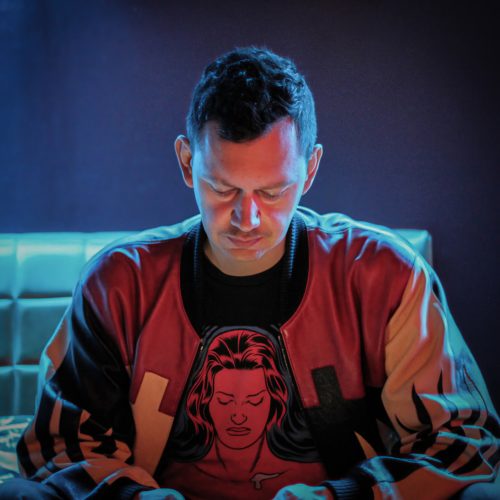
Soul Tuning
—
Release on 30 May 2025
—
Other Suns



French composer and producer Benoît de Villeneuve stands outside any genre, scene or category. Fusing electronics and acoustics, from a meditative to an intense sensibility, his musical practice is rooted in experimentation, in search of emotion.
“I sent this new album to Anthony Gonzalez in 2019. I had met him while working on the M83 album Dead Cities…. At the time, I was very interested in transhumanism and my album was part of the idea of the “augmented musician”: I wanted to compose and produce everything on my own, with the help of my machines. Today, with artificial intelligence as a new variation of transhumanism, the question of technology and sensitivity is more relevant than ever. But for me, technological tools should always be used only for the exploration of emotions.”
Anthony Gonzalez shares this enthusiasm: ‘The first time I listened to Soul Tuning, I was captivated. Its avant-garde spirit and its emotional and intellectual depth immediately appealed to me. Today, I am incredibly proud to release this album on Other Suns. It is an honour to share this work with as many people as possible.’
This album is neither a critique nor a naïve celebration of technology, but rather a poetic reverie on what it triggers in us: questioning, unease, vertigo and fascination.
A poetic quest for the soul in the digital age
Benoît de Villeneuve, known by his stage name Villeneuve, is a French musician, composer and producer who has carved out a unique place for himself on the contemporary music scene. He began his career in the 2000s in Paris, exploring a wide range of musical styles, from indie rock to ambient electronica and film music. His work, characterised by a subtle blend of electronic music, cinematic sounds and introspective poetry, explores the blurred boundaries between humans and technology, between the organic past and the digital future.
As a young teenager living in the provinces, he recognised himself in the rage brought by the American noise scene, through bands like Sonic Youth, which had suddenly become popular. He formed his first band, and then composed his first pieces on a four-track cassette recorder, with Aphex Twin and Autechre making him want to immerse himself in electronic music. This mixture of genres ultimately resembles his music, without barriers of style, at ease with saturated guitars, melodies and sound experiments alike. By mixing the most modern computer tools with the oldest instruments (harpsichord, piano, percussion, etc.), Villeneuve creates a link between the old and the new, in music that is both timeless and forward-looking.
Soul Tuning: a requiem for a digitised humanity
Soul Tuning is a work that marks a significant evolution in his career. He composed, performed and produced these pieces alone in his studio in Aubervilliers, using mainly a modular synthesiser and a few acoustic instruments. This choice reflects his desire to confront the limits imposed by technology, while seeking to preserve a certain spontaneity and physicality in his work.
“It’s an exploration of the existence of the soul, that of humans, that of artificial intelligence, but also that of music. I was very influenced by certain texts by Philip K Dick and Balard, and at a time when technology is developing at an exponential and dizzying pace, many situations imagined by these authors are becoming realities. I want the music to be non-utilitarian, to retain an air of mystery and magic, and to add soul and meaning.”
The album is inhabited by questions about spirituality, technology and the interaction between the two. The lyrics of the Soul Tuning songs are imbued with a certain melancholy, a strange inspiration that inhabits the music, linking the organic and digital elements. In tracks like ‘Silicon Soul’ and ‘Hard Drive Cemetery’, Villeneuve explores the fusion of human and machine, questioning the loss of soul that could result. The lyrics evoke a world where memory, identity and even the body can be modified, transformed or even erased, leaving the listener facing the anguish of an increasingly dehumanised existence.
“American libertarians identify with the transhumanist ideology. Most of them claim to follow Ayn Rand. This cult of selfishness, of individualism, of rejection of the collective, this obsession of a ruling class with optimisation, exploitation and disruption leads to a neo-feudalism, a techno-oligarchy with fascistic tendencies where the elimination of the weakest and the extraction of resources should no longer have any limits. On the contrary, I would like technology to promote care not only for nature but also for others. Technology and music must refine sensitivity, in the (perhaps utopian) service of a better relationship between human beings.”
The soundscape of Soul Tuning evokes a dystopian landscape, at once familiar and alien, where the sounds sometimes seem stretched, fatigued, resigned to producing only echoes of their own decline. One is reminded of the film Blade Runner set to music by Oneohtrix Point Never, or Philip Glass’ Koyaanisqatsi replaced by synthesizers. The title of the album, which could be translated as ‘the tuning of the soul’, reflects this ironic and melancholic quest to rediscover depth in a world where the soul could well be on the verge of extinction.
The album is not limited to a simple critique of the modern world; it also offers a quest, an attempt at reconciliation between the human and the digital. The musical compositions, often compared to cinematic soundscapes, reinforce this atmosphere of contemplation and introspection. Villeneuve manages to create a tension between the cold electronics of the synthesizers and the warmth of the acoustic instruments, as if to underline the opposition and complementarity between these two worlds.
Soul Tuning refuses to choose between despair and hope. It occupies an intermediate space, where the music seems to sing a requiem, while hinting at the possibility of a rebirth. The metaphors of dissolution and erasure, as in ‘Le Visage de Sable’, recall the fragility of human identity in the face of the inexorable advance of technology.
With this album, Villeneuve attempts to humanise abstract concepts such as computer science and cybernetics, integrating them into a poetic framework where emotion remains central. By confronting the organic with the synthetic, he creates music where art, technology and the spiritual quest intertwine in a complex and inseparable manner.